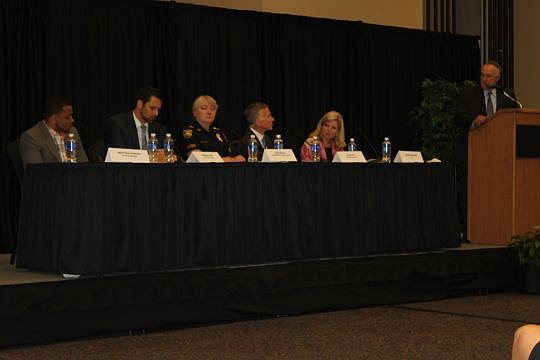
Matthew Duncan was a typical student in the DAWN Program.
He had dropped out in eighth grade. He didn’t have a stable family atmosphere growing up. He grew up in an area filled with crime and poverty.
At 17, he was arrested for the first time for trespassing. He was only in jail for a day or two. His most recent stint, though, was for a year for battery on a police officer.
That’s when he entered the grant-funded program founded by the late Richard McKissick. It offers classroom instruction, life skills and curriculum for attendees to earn their high school diplomas.
Duncan graduated from the program Jan. 15 and was on stage Monday at the University of North Florida.
He served as a voice of personal experience at Mayor Lenny Curry’s second community conversation on public safety, this one on reducing recidivism.
“I’m trying to help,” said Duncan.
He was joined by others with ties to the field: Kevin Gay, the founder of Operation New Hope; Tara Wildes, director of corrections at the Jacksonville Sheriff’s Office; Damian Cook, city Grants and Compliance administrator; and Circuit Judge Virginia Norton, who assists with the Developing Adults With Necessary Skills program, better known as DAWN.
Poverty and the need for jobs once a person has served his or her time were areas panelists viewed as critical to ensure the ex-offenders become contributing members of society.
Wildes said that often starts with basic needs — food, clothing, jobs — once they are released.
Gay’s Operation New Hope helps on the job front by trying to connect ex-offenders with employment.
He said look no further than a place like Texas, which has invested heavily into programs and has quieted naysayers who claimed doing so would increase crime. It’s done just the opposite, he said, and has become a bipartisan issue.
The city’s employment policy doesn’t discriminate against ex-offenders, said Cook, and there are opportunities there.
He also believes the community is ready to help tackle the issue as evidenced by eager participation in applying for a federal Promise Zone. The designation helps cities land federal grants and required buy-in from many sectors within a community. It would cover areas of the city most stricken by poverty.
Duncan said he thinks poverty is the reason most people ended up breaking the law.
They’re poor, growing up in bad conditions and want things they saw but don’t know a better way.
Norton said above a giant sign in the DAWN program facility doesn’t sugarcoat the reason why inmates are there. “I am here because I broke the law.”
But through tough love, accountability and a little nurturing the results often are successful.
They have been for Duncan. With the help of his grandmother, Carolyn, he is back on his feet with a job at a restaurant and on the cusp of going to college.
“I learned patience and determination,” he said.
The final community conversation on public safety will be April 4 at WJCT on the topic of health disparities.
(904) 356-2466